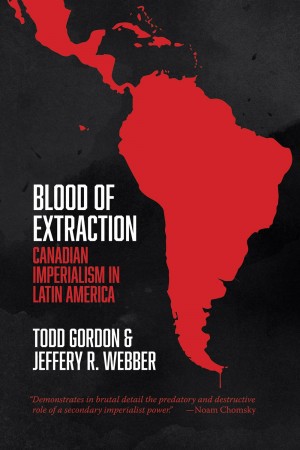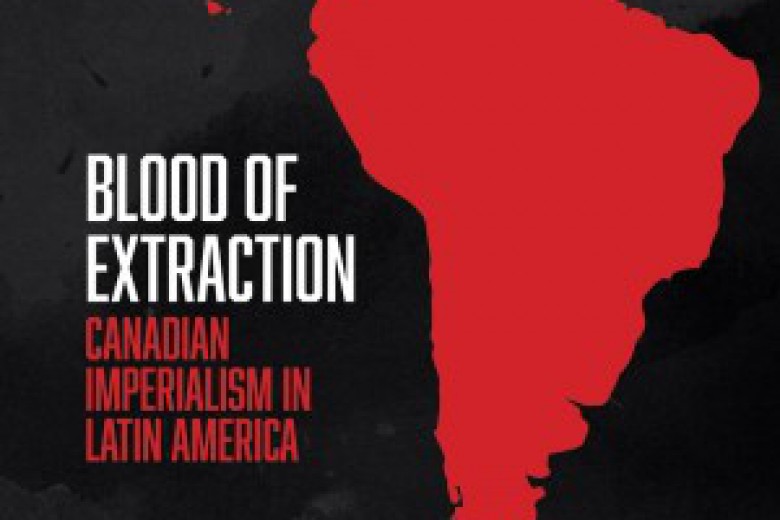
Canada and the Changing Structures of Global Power
Gordon and Webber’s new book is a major contribution to the study of Canadian political economy and foreign policy. Their book thoroughly undermines mainstream perspectives on Canada’s interventions in Latin America – for example, those emphasizing democracy promotion, counternarcotics, development assistance, and American dictates. Instead, the authors demonstrate that the economic and political interests of Canadian capital – particularly the interests of profit – drive Canadian foreign policy in the hemisphere.
In making this point, Gordon and Webber extend a line of academic and activist research that paints Canada as an imperialist state in the current world order. From this perspective, the Canadian economy is a relatively high-tech form of advanced capitalism; Canadian capitalists command and control an independent base of assets and revenue streams in the national economy; Canadian executives are constituted as a class through a dense network of interlocking corporate directorates; and Canadian business profits increasingly derive from foreign direct investment on a global scale.
Furthermore, while the Canadian state has always been structured and managed with the interests of capital in mind, it has become even more so in the neoliberal period – for example, by cutting social programs, disciplining unions, and signing international economic agreements that serve corporate profits over working-class life and the environment.
As resistance to neoliberalism has proliferated, the Canadian state and its principal allies have also engaged in disciplinary militarism toward any perceived threats to capital. In this context, the Canadian state, under Liberal and Conservative governments, has developed both a policy framework and an institutional capacity for a new grand strategy of armoured neoliberalism: a fusion of militarism and class warfare in Canadian state policies and practices around the world (see my book, Joining Empire: The Political Economy of the New Canadian Foreign Policy, 2014).
Gordon and Webber develop this line of analysis in significant ways. First, they insist that Canadian foreign policy in Latin America be viewed in relation to global dynamics of economic, political, and military power. For the authors, “[w]hat such an analysis reveals, is that Canada is one of the richest countries in the world, and it is operating within a global system of imperialism that continues to systematically benefit capital from the Global North at the expense of the people and ecologies of the Global South.”
In making this point, the authors extend the Marxist theory of imperialism to include ecological relations. As they put it, “[i]mperialism is an ecological phenomenon: it is shaped by ecological regimes, such as the ways in which certain natural resources have become central to capitalist accumulation and the geographical location of these natural resources, while it in turn transforms (usually destructively) local and regional ecologies in pursuit of profit.”
Importantly, the authors insist that racism is also integral to the economics and ecology of imperialism. In this regard, they focus on the dispossession of Indigenous peoples; the new border regimes that create apartheid-like zones of cheap labour around the world; and the systematic use of military violence by the North against the South.
With this deeper understanding of imperialism, the authors map and analyze the particular position of Latin America in the global hierarchy. In particular, they critically interrogate the “extractivist, export-driven, commodity-fuelled growth regime” that has guided recent development strategies in the hemisphere. For Gordon and Webber, the extractivist model is premised on the land-based dispossession of Indigenous peoples and poor peasants, and entails vast destruction of forests, farms, and water supplies. This “blood of extraction” has fostered a new dependency in Latin America, characterized by a boom-and-bust commodity cycle, de-industrialization, mass poverty and unemployment, and the repatriation of “super-profits” by multinational corporations in the resources sector.
In this context, a new “dialectic of capitalist expansion and popular resistance” has emerged. Indeed, Latin America has witnessed a wave of contentious resistance to neoliberalism by Indigenous peoples, working classes, and other social movements. The response of the U.S. and its regional allies has been what Gordon and Webber call militarized neoliberalism: “violence, fraud, corruption, and authoritarian practices on the part of militaries and security forces,” as well as “murder, death threats, assaults, and arbitrary detention against opponents of resource extraction.”
The authors are right to examine Canadian foreign policy in Latin America in this light. Indeed, as part of the extractivist boom, Canadian direct investment has poured into the region, reaching approximately C$60 billion in 2013. Canadian corporations in the resource sector – particularly in energy and mining – have led this investment invasion. The key motivation of these companies is not economic development, but profit. In fact, the authors reveal that several Canadian mining companies have earned nearly a 50 per cent rate of profit on their investments in Latin America – most of which is repatriated to Canada instead of reinvested in endogenous growth processes in the region.
Finally, the authors demonstrate the state-capital nexus by documenting the unfettered support of Canadian governments for Canadian corporate expansion in the hemisphere. As the authors reveal, “the depth and extent of Canadian capital’s penetration of Latin America would never have been possible without the backing of the Prime Minister’s Office, Foreign Affairs, including the embassies, the Canadian International Development Agency (CIDA), National Defense, Natural Resources Canada, and Health Canada – the true nature of the so-called ‘whole-of-government’ approach to foreign policy in action.”
The authors analyze the new toolkit of Canadian foreign policy in the region, including the redirection of development aid toward resource extraction and the use of corporate social responsibility to obfuscate the class exploitation and ecological destruction that attend the internationalization of capital.
Yet, if such policy tools fail, the Canadian state has increasingly shown support for authoritarian repression, including the 2009 military coup in Honduras. As part of the same agenda, it has also participated in joint military exercises with, and sold arms to, security services in Colombia, Peru, and Guatemala. In these ways, the blood shed by these states is inextricably linked to extraction.
Gordon and Webber’s analysis rests on sound theoretical reasoning and empirical research, and should become a seminal text on Canada’s role in Latin America. As academics and activists continue to build a theory of Canadian imperialism, however, several questions must be asked. First, while the world economy and state system are still defined by hierarchy and domination, including the “draining of the wealth and resources of poorer countries to the benefit of capital of the Global North,” new configurations of economic and political power require fresh analysis. The rise of China and several other industrializing powers in Asia has dramatically shifted the structure of labour, production, and class formation in the world economy, and led to variegated patterns of capitalist development in Asia and around the world, including in Latin America. If North–South relations are shifting in such ways, how does the concept of imperialism remain relevant?
For example, as Branko Milanovic has shown in his new book, Global Inequality (Harvard University Press, 2015), the winners of globalization are both the plutocrats of the North and the rising middle class of Asia, which has experienced real income gains over the past two decades, closely tied to market reforms in China under strong state direction. Milanovic also shows that inequality between nations has declined recently, and that inequality between individuals without regard to nationality has increased. In this context, Marxist analysis must pay close attention to diverse patterns of capital accumulation as well as class and state formation.
The question of U.S. hegemony must also be addressed more directly. Across the field of international relations, there is currently debate about U.S. decline and the prospect of multipolarity. Gordon and Webber show that U.S. capital remains the dominant source of foreign direct investment in Latin America, but they do not engage issues of geopolitical and economic competition in the region. How does Canadian foreign policy fit into the changing structure of power, both globally and in Latin America? Does it operate fully independently in a “post-hegemonic” region, or does it often dovetail with American objectives? The authors should address these issues in future work.
The authors should also engage with the research of Canadian political scientists Laura Macdonald and J.Z. Garrod. In a recent publication, MacDonald and Garrod argue that there is no longer a North–South divide in the world economy; that many mining companies headquartered in Canada are actually directed by Southern-based capitalists; that the notion of Canadian imperialism makes too strong a link between national mining firms and the state; that the global mining industry is now less nationally based and more integrated with transnational value chains; and that global mining firms use Canadian headquarters for propaganda purposes. For Macdonald and Garrod, then, “imperialism” is an unhelpful term for explaining Canada’s role in the new extractivism. While Gordon and Webber clearly demonstrate the state-capital nexus, future research should look more closely at the organizational structure of mining capital in Canada and around the world.
Finally, as part of building a leftist critique of Canadian corporate expansion, it is imperative to confront and debunk the mainstream theories of economic globalization more forcefully. The authors touch on this in the introduction, but the text could have benefited from a more thorough critique of liberal and institutionalist theories of trade, investment, and multinational corporations.
These issues aside, Blood of Extraction is a valuable addition to scholarship and activism around Canada’s changing role in Latin America. As Gordon and Webber conclude, “the only thoroughgoing framework capable of understanding both the drivers of Canadian foreign policy in the region and their consequences for local populations is one that situates Canada as a secondary imperialist power within a global system which systematically benefits capital from the Global North at the expense of the people and the environment in the Global South.”
Next:
Page 3. Simon Granovsky-Larsen, Backroom dealings and kick-back schemes
Previous:
Page 1. Todd Gordon and Jeffery Webber, Introduction
Ahead:
Page 4: Kyla Sankey, Accumulation by dispossession, expanded reproduction, and class transformations in Latin America
Page 5: Nicole Fabricant, Linking our consumptive lives to the trails of destruction
Page 6: Todd Gordon and Jeffery Webber, Response



